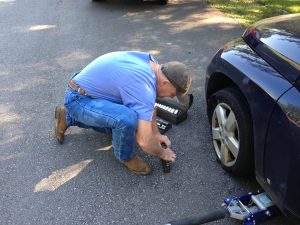I’m always surprised when I hear someone misquote a scripture, use a verse out of context, or use a supposed Bible verse that just isn’t found in the Bible. I can’t decide if I want to laugh and let it pass or try to find a gentle way to adjust the person’s error. I don’t know exactly how to correct someone without it seeming as if I’m trying to be superior and make him or her feel stupid.
I’m not saying I always know if I’m using a scripture correctly. But I’m reasonably sure I never claim a phrase is biblical if I don’t know for sure that it’s in the Bible. Here are just a few popular phrases that may or may not actually be found in scripture.
- “Cleanliness is next to godliness.”
No. The Old Testament contains a lot of scripture teaching ritual cleanliness, but this phrase is nowhere to be found in the Bible. And I’m grateful.
- “Be in the world but not of the world.”
Nope. There are some scriptures that imply this thought (e.g., John 15:19 and John 17:14–16), but this particular phrase is not there.
- “This too shall pass.”
No one is positive where this one originated. The day after Mike Ditka was fired from the Chicago Bears, he tearfully said, “Scripture tells you that all things shall pass.” In fact, over the next couple of days, he said it a couple more times. It ain’t in there.
- “The lion shall lie down with the lamb.”
This one surprised me. I love pictures I see of a lion cuddling with a lamb. Isaiah 11:6 (MSG) says, “The wolf will romp with the lamb, the leopard sleep with the kid. Calf and lion will eat from the same trough, and a little child will tend them.” Isaiah 65:25 (MSG) almost announces it: “Wolf and lamb will graze the same meadow, lion and ox eat straw from the same trough, but snakes—they’ll get a diet of dirt!” But there is no verse saying a lion will cuddle with a lamb, unfortunately.
I’ve noticed that some people tend to use Bible verses to emphasize or prove their beliefs or opinions. And most people, because they don’t want to question someone who seems to know what he or she is talking about, accept the nonscripture at face value.
But here’s some good news: I have the Holy Spirit living inside me. Ephesians 1:17–20 (NIV) says,
I keep asking that the God of our Lord Jesus Christ, the glorious Father, may give you the Spirit of wisdom and revelation, so that you may know him better. I pray also that the eyes of your heart may be enlightened in order that you may know the hope to which he has called you, the riches of his glorious inheritance in the saints, and his incomparably great power for us who believe. That power is like the working of his mighty strength, which he exerted in Christ when he raised him from the dead and seated him at his right hand in the heavenly realms.
When someone says something to me that doesn’t ring true, I have the freedom to know it might be the Holy Spirit nudging me and warning me of spiritual manipulation. Or it could be an innocent mistake.
During the 2016 election season, I was discussing the pros and cons of several candidates with a friend. She is very resolved on which side of the aisle she stands. At one point during our discussion, she loudly proclaimed, “Even Jesus said, ‘Give a man a fish, and he’ll eat for a day, but …’”
Wait! What?
I kept waiting for her to finish the quote, but apparently, she couldn’t remember the rest. She works hard to understand the Word and takes Bible study classes regularly, so I decided not to correct her. I prayed she would go home and Google that specific alleged scripture so she could remember the next time she chose to use it and, in so doing, find that it was not a scripture at all.
We have to be careful on two fronts. First, when we choose to use scripture to uphold our belief system, we’d better know that it is, in fact, in the Bible. Second, we need to have a basic idea of where it’s found in the Bible and know that we’re using it in the correct context. Here’s a third thought: we need to be confident we are teaching not doctrine but theology. Doctrine is a set of beliefs, usually dependent on a specific denomination. Theology focuses more on the study of God and faith rather than religion. Sometimes the differences may be foggy, and the methods may be different, but the message should always be valid. Often, we get a cosmic nudge from the Holy Spirit when something doesn’t ring of truth consistent with God’s Word.
Recently, my friend Jan told me about a meeting she’d experienced with a mutual supervisor in a faith-based ministry in which we both volunteer. Apparently, the conversation had become heated, and the leader had told Jan, “I’m going to tear your flesh.”
When Jan recounted the story to me, I said, “Whoa, whoa. Tear your flesh? What does that even mean?”
My feeling was that it was some scripture the leader had used to intimidate Jan and leave her fearful. But I wasn’t sure where it was in the Bible, and the Holy Spirit was speaking to me right then, telling me this was being used not as exhortation but as punishment.
After Jan and I finished our conversation, I began to research that phrase: “Tear your flesh.” After a couple of hours, I called Jan to tell her what I’d discovered.
“Jan, there have been times in my life when people have, whether intentionally or unintentionally, used scripture to throw me off balance and leave me feeling unstable in the confrontation. It’s a ploy to get the upper hand. You have to learn to hear with better ears, especially when someone uses scripture to undermine you. This person used a scripture that left you feeling vulnerable. It’s a scripture that he probably heard a pastor use and thought would be a great dart to throw. Or he was the victim of someone else’s ignorance and knew he could use that phrase to his advantage. When you told me what he said, I immediately felt something wasn’t right about it. I decided to listen to the tug of the Spirit’s prompting. Here’s what I found.
“There is a scripture that speaks of ‘tearing of the flesh.’ It’s in Micah 3:1–4 (NIV). Micah says, ‘Listen, you leaders of Jacob, you rulers of Israel. Should you not embrace justice, you who hate good and love evil; who tear the skin from my people and the flesh from their bones; who eat my people’s flesh, strip off their skin and break their bones in pieces; who chop them up like meat for the pan, like flesh for the pot? Then they will cry out to the Lord, but he will not answer them. At that time he will hide his face from them because of the evil they have done.’
“So what he’s saying to you—if he is, in fact, the flesh tearer—is that he tortures and abuses the people entrusted to him and, more importantly, hates what is good and loves what is evil. When he cries out to God, God’s not going to hear him, because of the evil he’s done. That’s what he’s saying about himself because he’s ignorant of how he’s misquoting and misusing scripture.”
Jan said, “Ooh. Should I call him out on that?”
I chuckled. “No, probably not. He will more than likely use it again. Then remind him, according to scripture, what he’s inferring about himself.”
There’ve been times in my life when I’ve been victimized by people who know how to use scripture or other phrases to throw me off track of the immediate issue. That way, they can feel they have the footing to bear down on me and come in for the kill.
I was once in a meeting with several people. One of the attendees was dissatisfied and disheartened by the way the ministry was moving. He voiced his opinion, and the ministry leader said, “You don’t have permission to do my inventory for me.” We all, about ten of us, just sat there and stared at the leader. The proclamation he’d broadcast was entirely off base with the concerns being addressed.
At some point, one of the other attendees said, “What does that have to do with what we’re talking about? No one here has any desire to do your inventory for you.” Although the leader said little for the rest of the meeting, we all felt the die had been cast. It wasn’t long before the team was dismantled. That leader destroyed a vibrant, soul-mending ministry, thanks to his own arrogance and selfish ambition. Second Timothy 2:15 (NIV) says, “Do your best to present yourself to God as one approved, a worker who does not need to be ashamed and who correctly handles the word of truth.”
It’s a command. We’re called to correctly handle the Word of truth. That doesn’t only mean we must be sure of how we administer the Word. It also means being sensitive to the Spirit of God and listening for the elbow nudge when someone uses scripture to incorrectly uphold his or her beliefs.
If something (or Someone) in you is telling you the statement isn’t ringing true, it’s probably not true. The best way I’ve found to get a good layout of scripture is, shockingly, by reading it. Yes, I read Bible studies, watch video series, and listen to Christian audiobooks, but the way to know and have a basic understanding of specific scripture locations is by reading. I have no agenda other than asking God to help me remember something, even one thing, I’m reading and, just as important, where it is in the Bible.
I ask him to reveal to me only what I need to know during that time. Occasionally, when someone asks where a verse is, I can at least remember the cadence or character of a specific biblical writer. It helps me discern when I feel something is being misused.
And again, I always make sure I keep my mouth shut if I’m not sure I’m using a verse correctly. I try to remember Romans 8:11 (NIV): “And if the Spirit of Him who raised Jesus from the dead is living in you, He who raised Christ from the dead will also give life to your mortal bodies because of His Spirit who lives in you.”
The Spirit lives in us. We can listen to his whisper when we need discernment. We can trust him to tell us when something ain’t right.
Whether it’s cleanliness and godliness or lions and lambs, I want to use scripture correctly. In fact, whenever possible, I think it’s crucial to insert my own favorite verse since I’m left-handed: “Thus sayeth the Lord, Everyone is born left-handed until they commit their first sin” (3 Timothy 7:11).






